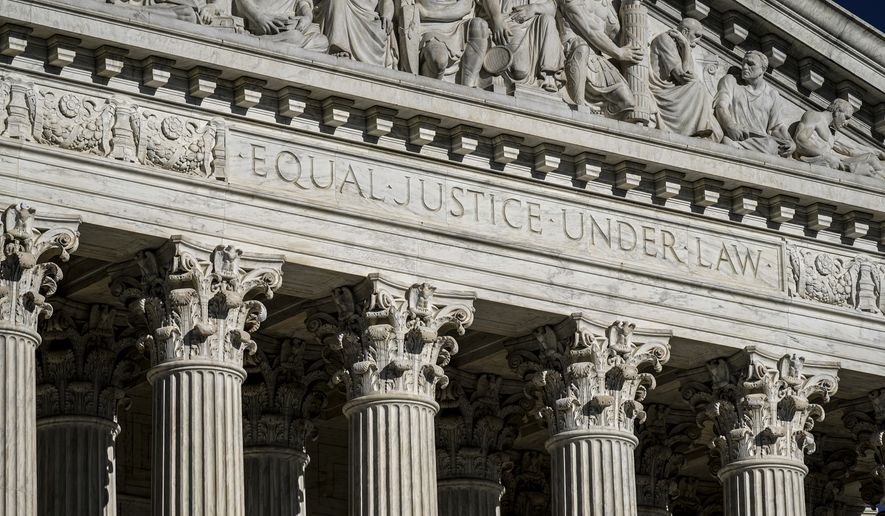The Supreme Court is weighing whether to allow city officials in Tulsa, Oklahoma, to issue speeding tickets to American Indian tribal members in a dispute over a $150 traffic fine — but the issue could affect the enforcement of other city ordinances in a territory where about a million people live.
Justin Hooper received a speeding ticket in Tulsa in 2018. He was fined $150 and paid the infraction.
Subsequently, though, he challenged the penalty after the Supreme Court issued its 2020 ruling in McGirt v. Oklahoma, where the court ruled 5-4 that Oklahoma lacked jurisdiction to prosecute an American Indian man for sex crimes against a child located on Indian territory.
The justices ruled it was up to the feds or tribal courts to prosecute such offenses.
Critics, though, have said the ruling has sent shock waves through the state, creating chaos for law enforcement.
Part of the issue is that under the McGirt ruling, an estimated 1.6 million more people are now seen as living on Indian territory. The ruling created a conflict over which law enforcement agencies — state, federal or tribal — have jurisdiction over certain crimes.
About half the state’s lands are home to dozens of tribes. The city of Tulsa, which has a population of more than 400,000, sits predominantly on a reservation. The metropolitan area combined with Tulsa proper is home to just over a million people.
Ninety-five percent of Tulsa, though, is considered Indian country, according to the city’s court filing.
Mr. Hooper reasoned he was ticketed on the Muscogee Creek reservation and is a member of the Choctaw Nation, a federally recognized tribe, so the city of Tulsa shouldn’t be able to collect on his traffic fine.
He took his case to municipal court, which ruled in favor of Tulsa.
Tulsa claims that a federal law from 1898 recognizes all residents of a city have to abide by that city’s ordinances without regard to race.
After losing in municipal court, Mr. Hooper took the issue to federal court where the district court sided with Tulsa again — but on appeal, the 10th U.S. Circuit reversed and said when Oklahoma became a state in 1907, the 1898 law giving city officials power to enforce ordinances was superseded by state law.
Tulsa asked the high court to hold off implementing the 10th Circuit’s decision, allowing city officials to continue to enforce city ordinances while it appeals to the Supreme Court, asking the justices to reconsider Mr. Hooper’s challenge.
“The consequences for the health and safety of all citizens within these cities are significant,” wrote the city attorney in Tulsa’s brief.
If Mr. Hooper’s victory were to stand, the ability of city officials to not only enforce traffic fines but also building codes and permits could be at stake.
It would take four justices to vote in favor of hearing the case for it to be scheduled for oral arguments.
Justice Neil M. Gorsuch, who oversees appeals from the 10th Circuit, said the appeals court order is on hold until Wednesday as the court reviews the parties’ filings, a temporary win for Tulsa.
Mr. Hooper’s attorney, John Dunn, told the justices they should deny Tulsa’s request, and allow the 10th Circuit’s ruling to be enforced while the city appeals to the high court for review, reasoning the high court is likely to uphold the panel’s decision in the end.
“Even if the Court were to review it, there is no fair prospect of reversal because the 10th Circuit’s interpretation of the relevant statute clearly is the right one,” Mr. Dunn said.
Oklahoma Gov. Kevin Stitt, a Republican, said he was pleased to see the high court temporarily delay the enforcement of the 10th Circuit’s “devastating” decision.
“If the Hooper decision stands, the City of Tulsa, using their own words to the Supreme Court, ’ … will no longer be able to enforce violations of municipal ordinances against Indian inhabitants,’” Mr. Stitt said. “We must operate under one set of rules, regardless of race, heritage or background, and cannot allow Tulsa and much of the rest of eastern Oklahoma to be turned into a reservation.”
The case is Hooper v. City of Tulsa.
• Alex Swoyer can be reached at aswoyer@washingtontimes.com.




Please read our comment policy before commenting.